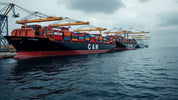
How Ever Given's Suez Canal Blockade Exposed Global Supply Chain Vulnerabilities
, by Unboxify, 4 min reading time

, by Unboxify, 4 min reading time
On March 23, 2021, the massive container ship Ever Given was navigating its route from Tanjung Pelepas in Malaysia to Rotterdam in the Netherlands when it encountered a severe sandstorm while passing through the Suez Canal in Egypt. This turbulent weather, with wind speeds reaching up to 74 km/h, made it impossible to steer the vessel. At 7:40 am local time, the ship collided with the side wall of the canal.
About 30 minutes after the collision, Egyptian tugboats and fire-fighting ships arrived at the scene, but the task ahead was arduous. Early images circulated on the internet showed the Ever Given lodged deeply into the canal's side wall. Satellite images further revealed a complete blockade of the passage.
The Ever Given is an ultra-large container ship, capable of carrying up to 20,124 containers, making it one of the largest vessels of its kind in the world. For context, imagine placing the Titanic or the Empire State Building on its side. Initial efforts to dislodge the ship using tugboats alone were unsuccessful. Excavators soon joined the effort, but the canal's profile, with its optimal depth in the center, posed a significant challenge.
The situation called for global expertise. Dutch firm Smit Salvage and Japan's Nippon Salvage were brought in for the massive rescue operation. Around the clock, salvage crews worked tirelessly, digging tons of sand from under the ship's bow and stern. Authorities hoped that higher tides and more tugboats would aid their efforts.
The Suez Canal connects the Red Sea to the Mediterranean, significantly reducing travel time for ships between the Indian Ocean and the North Atlantic by 8 to 10 days. It's a critical revenue stream for Egypt, garnering over 5 billion USD annually from transit fees. On average, each ship's transit costs exceed 300,000 dollars.
Despite its importance, parts of the canal operate on a single-lane system, necessitating alternating traffic for northbound and southbound vessels. Waiting areas, like the Great Bitter Lake, allow ships to hold for traffic or turn around if needed. Since the construction of the “New Suez Canal” in 2015, a larger portion of the canal supports two-way travel. However, where the Ever Given was trapped, only a single lane was available, bringing all traffic to a grinding halt.
During the six-day blockage, roughly 370 ships were stranded on both sides of the canal. It is estimated that the daily economic impact amounted to 9.6 billion USD in delayed goods. Shipping companies faced a difficult decision: wait for the canal to clear or reroute via the Cape of Good Hope, an expensive and lengthy alternative. This dilemma was compounded for vessels carrying livestock, where delays could lead to critical shortages of water and food.
The blockade couldn't have come at a worse time, as global supply chains were already stretched thin due to the Covid-19 pandemic. Lockdowns had reduced production and exports, particularly in Europe and North America, while the demand for imports from Asia, especially China, remained strong. This disparity led to a severe imbalance in container availability, with North America experiencing a 40% imbalance—only 40 out of every 100 containers were exported back.
On March 29, at around 3 pm local time, after 150 hours of intensive efforts and taking advantage of high spring tides, authorities finally freed the Ever Given. A fleet of 14 tugboats dislodged the ship, which was then towed to the Great Bitter Lake for inspection. Traffic through the Suez Canal resumed at 7 pm local time.
Although the Ever Given was freed, the aftermath of the blockade persisted. Ports in Europe and Asia braced for a surge of incoming ships, overwhelming even the largest facilities and creating a ripple effect on inland logistics. Analysts predicted disruptions and increased prices for various goods, and the public was advised that shortages and price hikes in stores could be a direct consequence of this maritime incident.
The Ever Given incident was a stark reminder of the fragility of global trade networks. With about 12% of global trade volume passing through the Suez Canal, any disruption has far-reaching consequences. The economic effects are not isolated but felt worldwide, underscoring the interconnected nature of modern commerce.
So, the next time you encounter a product shortage or a price increase, remember that ship and the significant role it played in this unprecedented event.